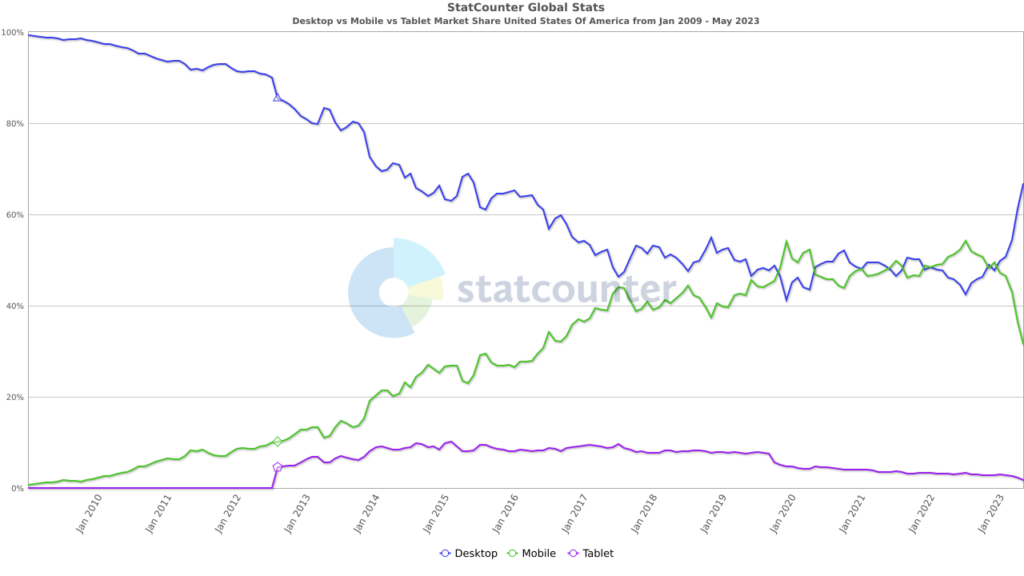The Importance of Mobile Optimization for Your Website
In today’s digital landscape, where smartphones have become an integral part of our lives, businesses must adapt to the changing habits of their target audience. With a significant shift towards mobile usage, ensuring your website is mobile optimized has become a crucial factor for success. Read on to discover the reasons why businesses need to prioritize mobile optimization and explore the key factors to consider when optimizing a website for mobile devices.

The Mobile Revolution:
Mobile devices, such as smartphones and tablets, have revolutionized the way people access information, connect with brands, and make purchasing decisions. According to recent statistics, mobile devices account for over 60% of global website traffic. This number is expected to continue to rise despite a recent downturn. This shift in consumer behavior has made mobile optimization a non-negotiable aspect of any successful digital marketing strategy.


User Experience and Engagement:
Mobile optimization directly impacts user experience, which plays a pivotal role in driving customer engagement and conversions. A mobile-friendly website ensures that visitors can easily navigate, read content, and interact with your brand on their smartphones. If your website is not optimized for mobile, visitors are more likely to abandon it and seek alternatives that offer a seamless mobile experience.
Search Engine Visibility:
Search engines, such as Google, prioritize mobile-friendly websites in their search results. Google’s mobile-first indexing approach means that a website’s mobile version is the primary basis for how it is indexed and ranked. By neglecting mobile optimization, you risk losing search engine visibility, which can significantly impact your website’s organic traffic and overall online visibility. Mobile optimization plays a role in your search engine optimization.
Faster Loading Speed:
Mobile users are often on the go and expect websites to load quickly. Statistics show that 53% of mobile users will abandon a website if it takes more than three seconds to load. Mobile optimization focuses on reducing page load times, improving site performance, and delivering a seamless browsing experience. By optimizing your website for mobile devices, you ensure that potential customers don’t lose interest due to slow loading speeds.
Social Media and Mobile Integration:
The rise of social media platforms has created a symbiotic relationship with mobile usage. Social media is predominantly accessed through mobile devices, and optimizing your website for mobile enhances its compatibility with social sharing and referral traffic. A mobile-friendly website facilitates seamless sharing of content, increasing the likelihood of viral marketing and expanding your brand’s reach.


Key Factors in Mobile Optimization:
To ensure your website is optimized for mobile devices, consider the following factors:
Responsive Design:
Adopt a responsive design approach that automatically adjusts your website layout and content based on the user’s screen size and device orientation. This ensures a consistent and user-friendly experience across various devices.
Mobile-Friendly Content:
Optimize your content for mobile consumption by utilizing shorter paragraphs, concise headlines, bullet points, and clear calls-to-action. Ensure that font sizes are legible on smaller screens and avoid using Flash, which is incompatible with many mobile devices.
Navigation and Menus:
Simplify your website’s navigation menu for mobile users. Implement collapsible menus, intuitive icons, and a clear hierarchy to make it easier for visitors to find what they’re looking for quickly.
Touch-Friendly Elements:
Make sure buttons, links, and interactive elements are large enough to be easily tapped with a finger. Avoid placing clickable elements too close together to prevent accidental clicks.
Testing and Optimization:
Regularly test your website on various mobile devices and screen sizes to identify any display or functionality issues. Conduct user testing and gather feedback to optimize the mobile experience continually.
In Summary
Mobile optimization is no longer an option; it is a necessity for any business seeking online success. By prioritizing mobile optimization, you provide an exceptional user experience, improve search engine visibility, and stay ahead of the competition. As mobile usage continues to grow, optimizing your website for mobile devices will ensure your brand remains accessible, engaging, and relevant to your target audience.
Remember, in the era of smartphones, a website that shines on mobile devices will shine in the eyes of your customers.
To learn more about mobile optimization and its impact on your digital marketing strategy, contact us today and we are more than happy to schedule a time to discuss!
Sources
- StatCounter. (2023). Global Stats - Browser, OS, Search Engine including Mobile Usage Share.
- Google. (2022). Understanding mobile page speed.
- Google Developers. (n.d.). Make the web work for everyone.



